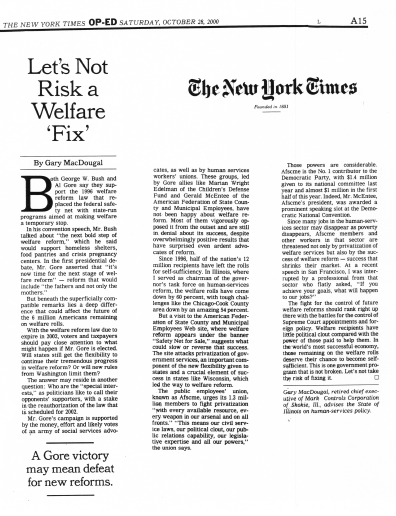The New York Times
10/28/2000
Copyright The New York Times Company
Gary MacDougal
 Both George W. Bush and Al Gore say they support the 1996 welfare reform law that replaced the federal safety net with state-run programs aimed at making welfare a temporary stop.
Both George W. Bush and Al Gore say they support the 1996 welfare reform law that replaced the federal safety net with state-run programs aimed at making welfare a temporary stop.
In his convention speech, Mr. Bush talked about "the next bold step of welfare reform," which he said would support homeless shelters, food pantries and crisis pregnancy centers. In the first presidential debate, Mr. Gore asserted that "it's now time for the next stage of welfare reform" -- reform that would include "the fathers and not only the mothers."
But beneath the superficially compatible remarks lies a deep difference that could affect the future of the 6 million Americans remaining on welfare rolls.
With the welfare reform law due to expire in 2002, voters and taxpayers should pay close attention to what might happen if Mr. Gore is elected. Will states still get the flexibility to continue their tremendous progress in welfare reform? Or will new rules from Washington limit them?
The answer may reside in another question: Who are the ''special interests,'' as politicians like to call their opponents' supporters, with a stake in the reauthorization of the law that is scheduled for 2002.
Mr. Gore's campaign is supported by the money, effort and likely votes of an army of social services advocates, as well as by human services workers' unions. These groups, led by Gore allies like Marian Wright Edelman of the Children's Defense Fund and Gerald McEntee of the American Federation of State County and Municipal Employees, have not been happy about welfare reform. Most of them vigorously opposed it from the outset and are still in denial about its success, despite overwhelmingly positive results that have surprised even ardent advocates of reform.
Since 1996, half of the nation's 12 million recipients have left the rolls for self-sufficiency. In Illinois, where I served as chairman of the governor's task force on human-services reform, the welfare rolls have come down by 60 percent, with tough challenges like the Chicago-Cook County area down by an amazing 54 percent.
But a visit to the American Federation of State County and Municipal Employees Web site, where welfare reform appears under the banner ''Safety Net for Sale,'' suggests what could slow or reverse that success. The site attacks privatization of government services, an important component of the new flexibility given to states and a crucial element of success in states like Wisconsin, which led the way to welfare reform.
The public employees' union, known as Afscme, urges its 1.3 million members to fight privatization "with every available resource, every weapon in our arsenal and on all fronts." "This means our civil service laws, our political clout, our public relations capability, our legislative expertise and all our powers," the union says.
Those powers are considerable. Afscme is the No. 1 contributor to the Democratic Party, with $1.4 million given to its national committee last year and almost $1 million in the first half of this year. Indeed, Mr. McEntee, Afscme's president, was awarded a prominent speaking slot at the Democratic National Convention.
Since many jobs in the human-services sector may disappear as poverty disappears, Afscme members and other workers in that sector are threatened not only by privatization of welfare services but also by the success of welfare reform -- success that shrinks their market. At a recent speech in San Francisco, I was interrupted by a professional from that sector who flatly asked, ''If you achieve your goals, what will happen to our jobs?''
The fight for the control of future welfare reforms should rank right up there with the battles for the control of Supreme Court appointments and foreign policy. Welfare recipients have little political clout compared with the power of those paid to help them. In the world's most successful economy, those remaining on the welfare rolls deserve their chance to become self-sufficient. This is one government program that is not broken. Let's not take the risk of fixing it.